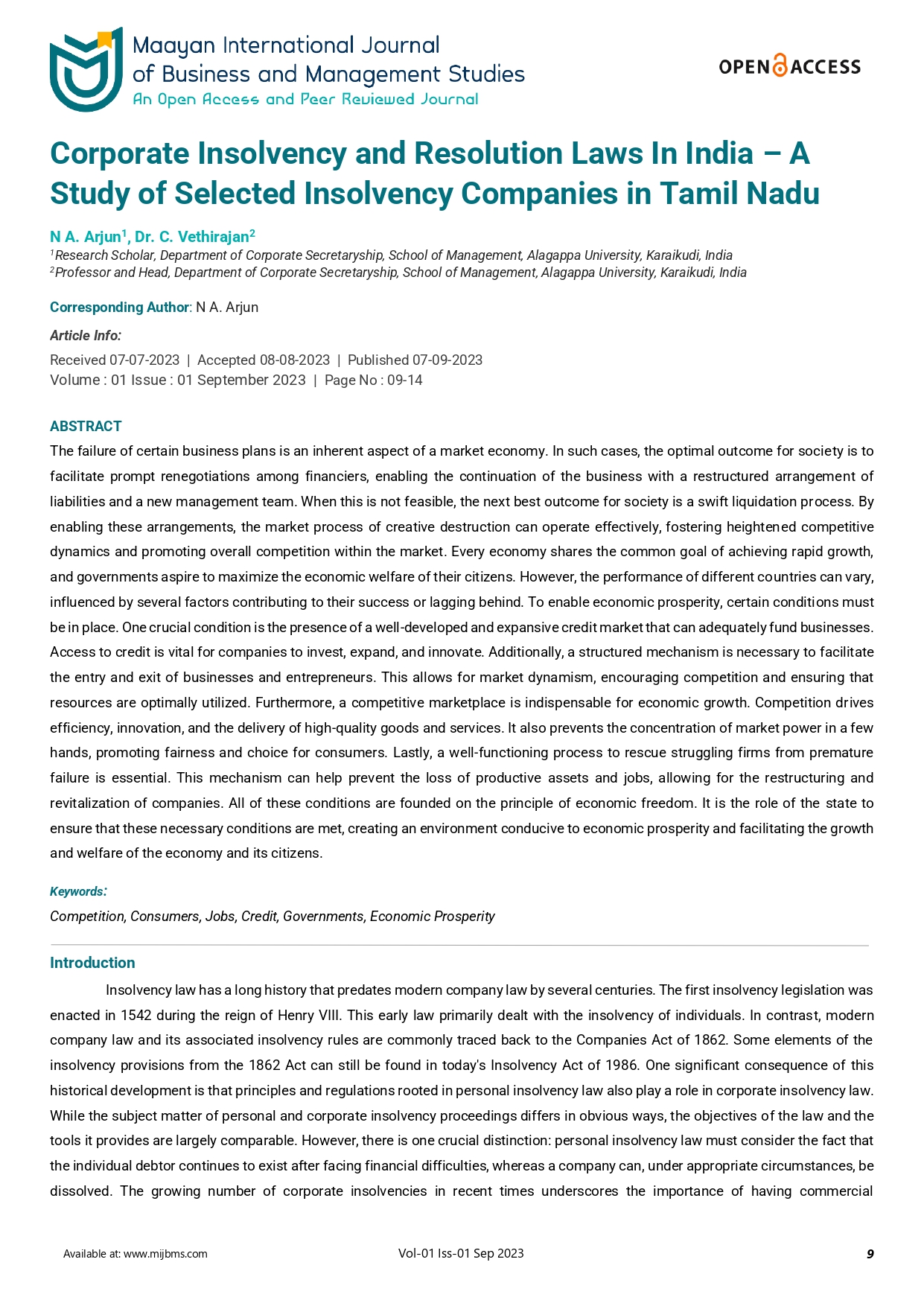Corporate Insolvency and Resolution Laws In India – A Study of Selected Insolvency Companies in Tamil Nadu
Keywords:
Competition, Consumers, Jobs, Credit, Governments, Economic ProsperityAbstract
The failure of certain business plans is an inherent aspect of a market economy. In such cases, the optimal outcome for society is to facilitate prompt renegotiations among financiers, enabling the continuation of the business with a restructured arrangement of liabilities and a new management team. When this is not feasible, the next best outcome for society is a swift liquidation process. By enabling these arrangements, the market process of creative destruction can operate effectively, fostering heightened competitive dynamics and promoting overall competition within the market. Every economy shares the common goal of achieving rapid growth, and governments aspire to maximize the economic welfare of their citizens. However, the performance of different countries can vary, influenced by several factors contributing to their success or lagging behind. To enable economic prosperity, certain conditions must be in place. One crucial condition is the presence of a well-developed and expansive credit market that can adequately fund businesses. Access to credit is vital for companies to invest, expand, and innovate. Additionally, a structured mechanism is necessary to facilitate the entry and exit of businesses and entrepreneurs. This allows for market dynamism, encouraging competition and ensuring that resources are optimally utilized. Furthermore, a competitive marketplace is indispensable for economic growth. Competition drives efficiency, innovation, and the delivery of high-quality goods and services. It also prevents the concentration of market power in a few hands, promoting fairness and choice for consumers. Lastly, a well-functioning process to rescue struggling firms from premature failure is essential. This mechanism can help prevent the loss of productive assets and jobs, allowing for the restructuring and revitalization of companies. All of these conditions are founded on the principle of economic freedom. It is the role of the state to ensure that these necessary conditions are met, creating an environment conducive to economic prosperity and facilitating the growth and welfare of the economy and its citizens.
Downloads
References
- Mann, Yogendra & Mann, Kavindra. (2019). Corporate Insolvency Law in India: Provisions and Effectiveness. IGI Global Publishing Tomorrow’s Research Today, Chapter 4, 74-87. DOI: 10.4018/978-1-5225-5541-4.ch004
- Sahoo, M. S., & Guru, A. (2020). Indian Insolvency Law. Vikalpa: The Journal for Decision Makers. 45(2), 69-78. DOI: 10.1177/0256090920939809.
- Djankov, S., Hart, O., McLiesh, C., & Shleifer, A. (2008), Debt enforcement around the world. Journal of Political Economy, 116(6), 1105–1149.
- Garrido, J., Bergthaler, M. W., DeLong, M. C. M., Johnson, J., Rasekh, A., Rosha, A., & Stetsenko, N. (2019). The use of data in assessing and designing insolvency systems. International Monetary Fund, 44, 9781484396223, 1018-594

Downloads
Published
How to Cite
Issue
Section
License
Copyright (c) 2023 Maayan International Journal of Business and Management Studies

This work is licensed under a Creative Commons Attribution 4.0 International License.


